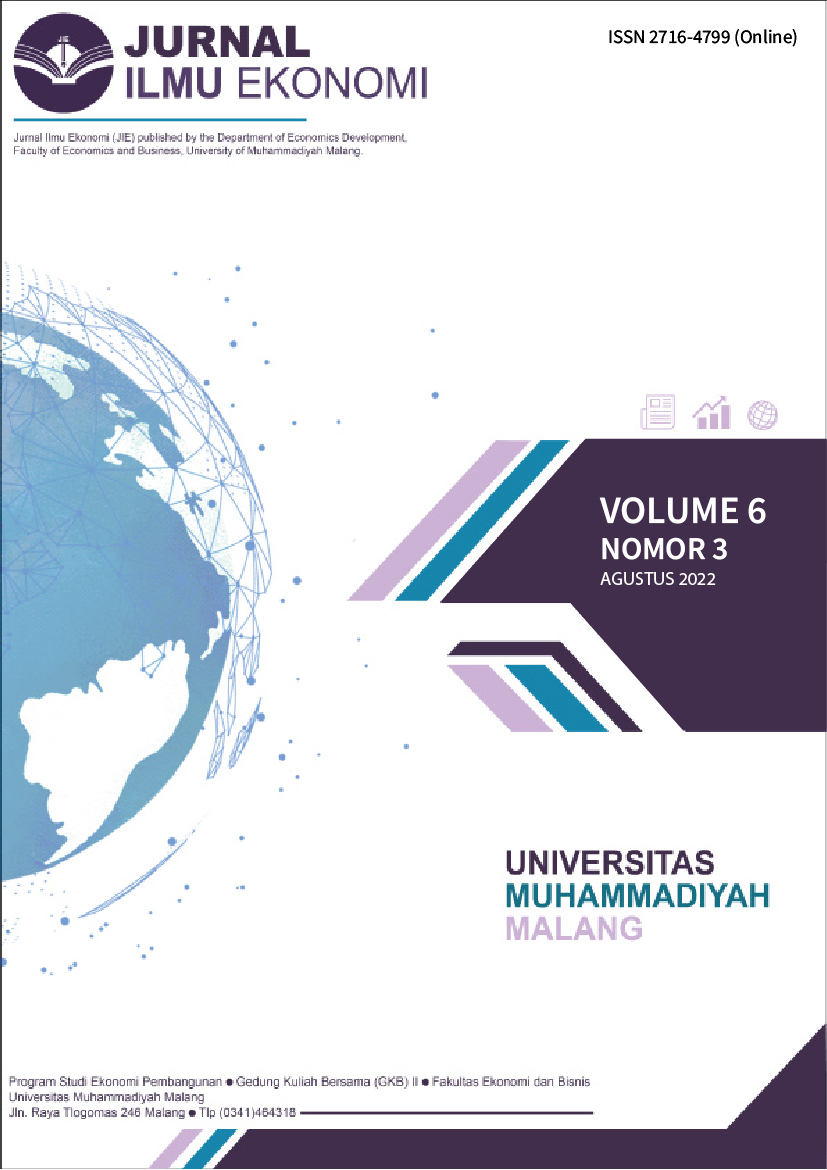Pengaruh Nilai Tukar, Suku Bunga dan Inflasi Terhadap Utang Luar Negeri Indonesia Tahun 2001-2020
DOI:
https://doi.org/10.22219/jie.v6i3.22297Keywords:
Exchange Rate, Interest Rate, Inflation, Foreign DebtAbstract
This study aims to determine the effect of exchange rates, interest rates and inflation on Indonesia's foreign debt in 2001-2020. This study uses quantitative methods with the analysis tool used is multiple regression with the EViews9 program. The data used in this study were taken from the websites of Bank Indonesia (BI), the World Bank and the Central Statistics Agency. The results obtained indicate that the exchange rate has a significant positive effect on Indonesia's foreign debt, interest rates have an insignificant negative effect on Indonesia's foreign debt, and inflation has a significant negative effect on Indonesia's foreign debt.
Penelitian ini bertujuan untuk mengetahui pengaruh nilai tukar, suku bunga dan inflasi terhadap utang luar negeri Indonesia pada tahun 2001-2020. Penelitian ini menggunakan metode kuantitatif dengan alat analisis yang digunakan adalah regresi berganda dengan program EViews9. Data yang digunakan dalam penelitian ini mengambil dari website Bank Indonesia (BI), World Bank dan Badan Pusat Statistik (BPS). Hasil yang diperoleh menunjukkan bahwa nilai tukar berpengaruh positif signifikan terhadap utang luar negeri Indonesia, suku bunga berpengaruh negatif tidak signifikan terhadap utang luar negeri Indonesia, dan inflasi berpengaruh negatif signifikan terhadap utang luar negeri Indonesia.
Downloads
References
Atanta, A., & Rizki, C. Z. (2018). Hubungan Sebab Akibat Utang Luar Negeri Dan Kurs Di Indonesia. Jurnal Ilmiah Mahasiswa (JIM) Ekonomi Pembangunan Fakultas Ekonomi Dan Bisnis Unsyiah, 3(3), 284–293.
Defrizal Saputra, Hasdi Aimon, M. R. A. (2018). ANALISIS FAKTOR-FAKTOR YANG MEMPENGARUHI UTANG LUAR NEGERI DI INDONESIA. World Development, 1(1), 1–15.
Forgha, N. G., & Ngangnchi, F. H. (2014). “External Debt, Domestic Investment and Economic Growth in Cameroon” A system Estimation Approach. Journal of Economics Bibliography, 1(1), 3–16.
Gujarati, Damodar N, Down C. Porter. 2012. Dasar-dasar Ekonometrika Edisi 5. Jakarta Selatan: Salemba Empat.
Iskandar, S., & Suseno. (2004). Sistem dan Kebijakan Nilai Tukar. In Seri Kebanksentralan (Vol. 12, Issue 12).
Kemenkeu, D. (2017). Utang Diperlukan agar Pemerintah Bisa Menjalankan Fungsi Penting dan Mendesak. DJPPR KEMENKEU.
Madura, Jeff. 2002. Manajemen Keuangan Internasional, Edisi kesatu. Jakarta: Erlangga. Ciracas.
Mankiw, N Gregory. 2003. Makroekonomi. Jakarta: Erlangga.
Mankiw, N Gregory. 2012. Pengantar Ekonomi Makro. Jakarta Selatan: Salemba Empat.
Penyusun. (2016). PEDOMAN PENYUSUNAN SKRIPSI / TUGAS AKHIR FAKULTAS EKONOMI & BISNIS.[Universitas Muhammadiyah Malang]
Rahman, A., & Gemilang, R. (2017). Posisi Defisit Anggaran Dan Kurs Dalam Kebijakan Utang Luar Negeri Pemerintah Indonesia. Jurnal Economix, 5(1), 100–111.
Ramadhani, M. A. (2014). Pengaruh Defisit Anggaran, Pengeluaran Pemerintah dan Hutang Luar Negeri Terhadap Pertumbuhan Ekonomi (Studi Kasus 6 Negara Asean Tahun 2003-2012). Jurnal Ilmiah Mahasiswa FEB, 2(1), 1–17.
Ristuningsi, Septiyanti. 2016. “Analisis Faktor-faktor yang mempengaruhi Utang Luar Negeri Tahun 1984-2014”. Jurnal ekonomi.
Sadim, V. F. (2019). Analisis Faktor-Faktor Yang Mempengaruhi Utang Luar Negeri Indonesia [Universitas Negeri Makassar].
Samuelson, Paul A dan William, D Nordhaus 2004. Ilmu Makroekonomi; Edisi Bahasa Indonesia. Jakarta: PT Media Global Edukasi.
Simorangkir, Iskandar Suseno. 2004. Sistem Dan Kebijakan Nilai Tukar, Seri Kebangsentralan No.12. Jakarta: Penerbit Pusat Pendidikan dan Kebangsentralan Bank Indonesia.
Tambunan, Tulus Tahi Hamongan. 2008. Pembangunan ekonomi dan Utang Luar Negeri. Jakarta: Rajawali Pers.
Downloads
Published
How to Cite
Issue
Section
License
Copyright (c) 2022 Afandi, M. F.

This work is licensed under a Creative Commons Attribution-ShareAlike 4.0 International License.
Authors who publish with this journal agree to the following terms:
- For all articles published in the JIE (Jurnal Ilmu Ekonomi), copyright is retained by the authors. Authors give permission to the publisher to announce the work with conditions. When the manuscript is accepted for publication, the authors agree to the automatic transfer of non-exclusive publishing rights to the publisher.
- Authors retain copyright and grant the journal right of first publication with the work simultaneously licensed under a Creative Commons Attribution-NonCommercial-ShareAlike 4.0 International License that allows others to share the work with an acknowledgement of the work's authorship and initial publication in this journal.
- Authors are able to enter into separate, additional contractual arrangements for the non-exclusive distribution of the journal's published version of the work (e.g., post it to an institutional repository or publish it in a book), with an acknowledgement of its initial publication in this journal.
- Authors are permitted and encouraged to post their work online (e.g., in institutional repositories or on their website) prior to and during the submission process, as it can lead to productive exchanges, as well as earlier and greater citation of published work (See The Effect of Open Access).
This is an open access article and licensed under a Creative Commons Attribution-NonCommercial-ShareAlike 4.0 International License








